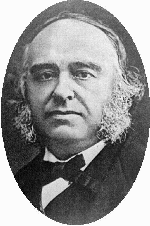

 Paul Pierre Broca, brilliant French surgeon and anthropologist, was born in Sainte-Foy-la-Grande,
in 1824. He was a prodigy as a child, holding baccalaureate degrees simultaneously in literature, mathematics and
physics. He entered the medical school when he was only 17 years old, and graduated at 20, when most of his contemporaries
were just beginning as medical students.
Paul Pierre Broca, brilliant French surgeon and anthropologist, was born in Sainte-Foy-la-Grande,
in 1824. He was a prodigy as a child, holding baccalaureate degrees simultaneously in literature, mathematics and
physics. He entered the medical school when he was only 17 years old, and graduated at 20, when most of his contemporaries
were just beginning as medical students.
Broca studied Medicine in Paris. He became very early a professor of surgical pathology at the University of Paris and a noted medical researcher in many areas. At 24 years of age he already was being showered with awards, medals and important positions. His early scientific works dealt with the histology of cartilage and bone, but he also studied cancer pathology, the treatment of aneurisms and infant mortality. As a superb brain anatomist, he made important contributions to the understanding of the limbic system, or rhynencephalon.
But the field of study where Broca became famous and a towering figure in the history of medicine and the neurosciences, was his discovery of the speech center (now known as the Broca's area or the third circumvolution of the frontal lobe). He arrived at this discovery by studying the brains of aphasic patients (persons unable to talk), particularly the brain of his first patient in the Bicêtre Hospital, named "Tan", who was shown by Broca in 1861 to have a neurosyphilitic lesion in one side of the brain, precisely in the area which controlled speech.
Broca was also a pioneer in the study of physical anthropology. He founded the Anthopological Society of Paris in 1859, the Revue d'Anthropologie in 1872, and the School of Anthropology in Paris in 1876. He advanced the science of cranial anthropometry to new heights, by developing many new types of measuring instruments (craniometers) and numerical indices. Other field which Broca contributed significantly was the comparative anatomy of primates. He described for the first time trephined skulls from the Neolithic. He was very interested in the relation between anatomical features of the brain and mental capabilities, such as intelligence.
As a personality, Broca seemed to be a remarkable individual. His contemporaries described him as a "generous, compassionate and kind, with unbreakable fortitude and honesty, venerated by all. He never made an enemy and never lost a friend. He was noble and a Christian follower" (however, he founded in 1848 a society of free-thinkers, was sympathetic to Darwin's theory of natural selection, and was denounced by authorities as a subversive figure, a materialist and a corrupter of the youth). He was an indefatigable worker and wrote hundreds of books and papers (53 of them alone devoted to studies on the brain). He was also concerned with health care for the poor, being an important figure in the Assistance Publique.
Near the end of his life, Paul Broca was elected a lifetime member of the French Senate. He was also a member of the French Academy and held honorable degrees of many other learned institutions, in France and abroad.
Pierre Paul Broca died in Paris, in 1880, probably
of a brain aneurism.
 To
Know More
To
Know More
| From: The History of Psychosurgery Author: Renato M.E. Sabbatini, PhD Source: Brain & Mind Magazine, June 1997 |